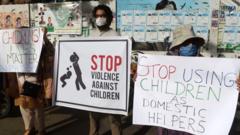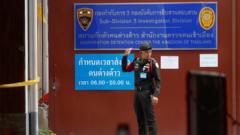The heartbreaking case has reignited discussions on child labor and domestic worker exploitation in the country.
**Outrage Erupts Over Tragic Death of Child Maid in Pakistan**

**Outrage Erupts Over Tragic Death of Child Maid in Pakistan**
Anger mounted in Pakistan following the death of a 13-year-old girl employed as a maid, allegedly murdered for stealing chocolates.
In a deeply disturbing incident, a couple in northeast Pakistan is under suspicion for allegedly murdering Iqra, a 13-year-old girl who worked as their maid, reportedly over a theft of chocolates. The girl was admitted to a hospital last Wednesday, suffering from multiple injuries, and succumbed shortly thereafter. Preliminary investigations by the police indicate that she was subjected to severe torture.
The heart-wrenching case, registered in Rawalpindi, has ignited a wave of public outrage. Supporters have taken to social media, rallying around the hashtag #JusticeforIqra, which has amassed tens of thousands of views. As Iqra’s plight captures national attention, it further fuels the ongoing conversation about child labor and the appalling mistreatment of domestic workers in Pakistan.
Iqra’s father, Sana Ullah, expressed his devastation upon receiving the news of her hospitalization. Rushed to her side, he found her unconscious, fighting for her life. Iqra had entered domestic work at a tender age of eight, primarily to help alleviate her family's financial burdens. Having worked for several employers, she ultimately became employed by the couple, who also had eight children, earning a meager salary of approximately £23 ($28) per month.
The police indicated that accusations of theft were leveled against Iqra, but evidence collected suggests a history of physical abuse. Disturbing images and videos reveal multiple fractures in her limbs and significant head trauma. An autopsy is currently being conducted to evaluate the full scope of her injuries, pending which the authorities continue their inquiries.
Activist Shehr Bano lamented the tragedy, stating, “My heart cries tears of blood. How many... are subjected to violence in their homes every day for a trivial job of a few thousand?” Numerous social media users took to platforms to emphasize the shocking nature of her death, questioning the moral fabric of a society that permits such atrocities.
The couple, Rashid Shafiq and his wife Sana, have since been detained, alongside a Quran teacher who had transported Iqra to the hospital. Uncertainty lingers regarding the teacher's understanding of Iqra's family situation at the time.
Iqra's father seeks justice, calling for the punishment of those accountable for his daughter’s tragic demise. While similar cases often invoke public outcry, documented evidence suggests a trend where many are resolved outside the courtroom, leading to a scarcity of successful prosecutions.
This incident echoes a previous high-profile case from 2018, where a judge and his wife were jailed for torturing their young maid, only to have their sentences later reduced. Legal experts reveal that, under Pakistani law, victims’ families have opportunities to forgive assailants, often driven by financial incentives rather than a genuine pursuit of justice.
Recent statistics unveil the gravity of the child labor crisis in Pakistan, with an alarming 3.3 million children engaged in work, according to UNICEF. Furthermore, women and young girls constitute the majority of the 8.5 million domestic workers, as reported by the International Labour Organisation (ILO). As the nation grapples with these harsh realities, the demand for systemic reform becomes increasingly urgent.
The heart-wrenching case, registered in Rawalpindi, has ignited a wave of public outrage. Supporters have taken to social media, rallying around the hashtag #JusticeforIqra, which has amassed tens of thousands of views. As Iqra’s plight captures national attention, it further fuels the ongoing conversation about child labor and the appalling mistreatment of domestic workers in Pakistan.
Iqra’s father, Sana Ullah, expressed his devastation upon receiving the news of her hospitalization. Rushed to her side, he found her unconscious, fighting for her life. Iqra had entered domestic work at a tender age of eight, primarily to help alleviate her family's financial burdens. Having worked for several employers, she ultimately became employed by the couple, who also had eight children, earning a meager salary of approximately £23 ($28) per month.
The police indicated that accusations of theft were leveled against Iqra, but evidence collected suggests a history of physical abuse. Disturbing images and videos reveal multiple fractures in her limbs and significant head trauma. An autopsy is currently being conducted to evaluate the full scope of her injuries, pending which the authorities continue their inquiries.
Activist Shehr Bano lamented the tragedy, stating, “My heart cries tears of blood. How many... are subjected to violence in their homes every day for a trivial job of a few thousand?” Numerous social media users took to platforms to emphasize the shocking nature of her death, questioning the moral fabric of a society that permits such atrocities.
The couple, Rashid Shafiq and his wife Sana, have since been detained, alongside a Quran teacher who had transported Iqra to the hospital. Uncertainty lingers regarding the teacher's understanding of Iqra's family situation at the time.
Iqra's father seeks justice, calling for the punishment of those accountable for his daughter’s tragic demise. While similar cases often invoke public outcry, documented evidence suggests a trend where many are resolved outside the courtroom, leading to a scarcity of successful prosecutions.
This incident echoes a previous high-profile case from 2018, where a judge and his wife were jailed for torturing their young maid, only to have their sentences later reduced. Legal experts reveal that, under Pakistani law, victims’ families have opportunities to forgive assailants, often driven by financial incentives rather than a genuine pursuit of justice.
Recent statistics unveil the gravity of the child labor crisis in Pakistan, with an alarming 3.3 million children engaged in work, according to UNICEF. Furthermore, women and young girls constitute the majority of the 8.5 million domestic workers, as reported by the International Labour Organisation (ILO). As the nation grapples with these harsh realities, the demand for systemic reform becomes increasingly urgent.



















